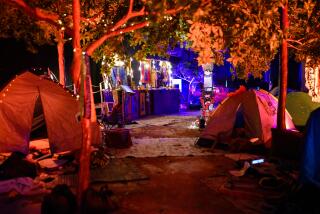Competing in Tel Aviv Was a Triumph in Itself
- Share via
One is a world-class athlete. The other spends most of his days making sure soaps and cosmetics get to the right stores.
Both, however, can share with any athlete who might have fears about stepping back into the spotlight--and potential target--of big-time sports the knowledge of what it’s like to play against a backdrop of violence.
In fact, they went out of their way to compete in one of the most turbulent regions on the globe, a place where terrorist attacks are almost a regular part of Iife.
Lenny Krayzelburg and Mark Knue (pronounced ka- noo ) were among more than 300 American athletes who participated in the Maccabiah Games in Israel during the summer. The games bring together Jewish athletes from around the world every four years.
Krayzelburg, who turns 26 next week, is a swimmer who won three gold medals at the Sydney Olympics last year.
Knue, 41, a vice president in charge of health and beauty products for a wholesale company, played point guard for the U.S. in the masters’ division (for people 40 and older) basketball tournament at the Maccabiah Games.
The escalation of conflicts between Israelis and Palestinians over the last year jeopardized the competition. When a suicide bomber killed 18 Israelis in an attack on a disco in Tel Aviv, the American contingent seriously considered staying home--and the Maccabiah Games were nearly postponed until next year.
The games went on, and Krayzelburg and Knue went to Israel. They came back feeling stronger than ever that it was the right decision.
“What was more gratifying to me was how many people came up to me and told me what an example I set, coming to the games and participating,” said Krayzelburg, who won the 100-meter backstroke and swam on the winning 400-meter medley relay team events. “I wasn’t doing it to prove a point. I set a goal for myself to go to the games and participate.
“It’s a great cultural event for me, as a Jewish person, to learn about Israel. It wasn’t to prove how fast I could go or how much I could win by. It was an experience.”
Both men had to overcome concerns by jittery family members. Krayzelburg’s parents, who moved from Russia to Los Angeles with Lenny in the late 1980s, split on the Maccabiah Games. His father wanted him to go, his mother wanted him to stay home. Knue’s wife and three children didn’t want him to go.
Knue also was part of an e-mail chain comprising about 25 people, which generated some heated debates about whether or not to participate.
Knue said that one of the members who’d decided not to go because of fears of violence worked in the World Trade Center and is presumed dead. On the other side of fate’s coin, Knue relates a story he heard about a woman who worked on the upper floors of the World Trade Center but was in Israel last week.
It’s the saddest of ironies. It would have been safer to be at the center of the Middle Eastern conflict than to be in a New York office building on Sept. 11.
“When you’re in this country and you look at everything that goes on in the Middle East--especially when you watch CNN--you get a different feel,” Knue said.
“You’re petrified to go. You’re nervous. Your family is driving you crazy about why would you do this.
“Then you get over there, there’s this feeling that you’re not afraid when you’re there.”
There were soldiers on the streets. There was activity, business, the hum of a city. Life.
There were armed guards on the team buses to and from the venues. Spectators’--and players’--bags had to go through X-ray machines upon entry into the stadium. Fans had to park miles away from the stadium and take buses to the opening ceremony.
Krayzelburg had been through tight security at the Olympics. He finds the extra safety measures more of a comfort than a distraction.
“From an athlete’s standpoint, it’s always great and reassuring that all the safety measures are taken care of,” he said. “You go to perform and know everything’s going to be OK.
“It’s all in everybody getting used to it. After a while, it just becomes normal.”
In Israel, normal is living with the threat of terrorist attacks, a concept new to Americans.
“In Israel, people are faced with this literally every single day,” Krayzelburg said. “But they don’t let it affect their everyday life.
“Here, we never thought such a thing could happen to us. People don’t know how to act. They’re confused and not too sure what could happen.
“My belief is, if it’s meant to be, it’s meant to be,” he said. “You can’t worry too much every single day.”
Knue had his own brush with death while driving near his home in Cincinnati three weeks before his trip to Israel. A car flipped and went careening across the freeway. Knue figures it would have crashed into him if he’d been only five seconds earlier.
It’s all convinced him that “You just don’t know it’s your time. Fate is fate.”
You have to take your chances, in other words. And he wishes the major sports leagues would have been in action the first weekend after the attacks.
“I think they should have [played],” Knue said.
“I think that when you sit back and you let [the terrorists] realize [what’s happening], they’re probably just laughing at us. Wall Street shut down, all these sporting events shut down. We don’t know how to handle it. The Israelis would have never canceled. They were furious with us when we canceled [the Maccabiah Games] originally.
“You’re the loser if you let them change life.”
After the attacks, Knue said, “I was glued to the TV for three days. But I think we need to move on. The Ryder Cup being canceled ... I just don’t think that’s right. I think they should play on. Play on, man.
“I think we have to look differently at the security, at how we handle it,” he added. “But you can’t live your life looking over your shoulder. Life is precious. Live the day and realize how important family is.”
*
J.A. Adande can be reached at j.a.adande@latimes.com.
More to Read
Go beyond the scoreboard
Get the latest on L.A.'s teams in the daily Sports Report newsletter.
You may occasionally receive promotional content from the Los Angeles Times.






